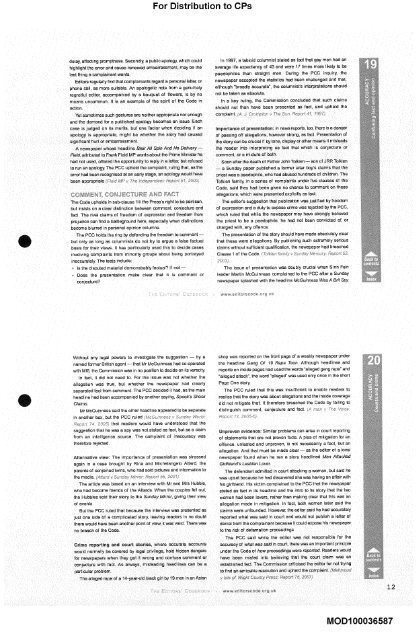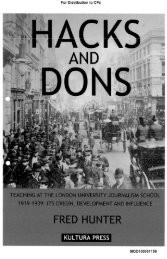The Edi ' - The Leveson Inquiry
The Edi ' - The Leveson Inquiry
The Edi ' - The Leveson Inquiry
You also want an ePaper? Increase the reach of your titles
YUMPU automatically turns print PDFs into web optimized ePapers that Google loves.
For Distribution to CPs<br />
delay, affecting promptness. Secondly, a public apology, which could<br />
In 1997. a tabloid columnist stated as fact that gay me~ had an<br />
highlight the error and cause renewed embarrassment, may be the average life expectancy of 43 and were 17 times more likely to be<br />
last thing a complainant wants,<br />
paedophilea than straight men. During the PCC inquiry, the<br />
<strong>Edi</strong>tors regularly find that complainants regard a ~ersonal letter or newspaper accepted the statistics had been challenged and that.<br />
phone call. as more suitable. An apologetic note from a genuinely a though "broadly accurate", the columnist’s interpretations should<br />
regretful editor, accompanied Dy a bouquet of flowers, is by 3o not be taken as absolute.<br />
means uncommon, it is an example of the spirit of the Code in ?n a key ruling, the Commission concluded thai such clatms<br />
action.<br />
Yet sometimes such gestures are neither appropriate nor enough<br />
and the demand for e published apology becomes an ~ssue Each<br />
case is judged on its merits, but one factor when deciding if an<br />
~ pology is appropriate, might be whether the story had caused<br />
ignificant hurt or embarrassment.<br />
A newspaper whose headline Blair All Spin And No Delivery-<br />
Field, attributed to Frank Field MP words about the Prime Minister he<br />
had not used, offered the opportunity to reply in a letter, but refused<br />
to run an apology <strong>The</strong> PCC upheld the complaint, ruling that, as the<br />
error had been recognised at an early stage, an apology would have<br />
been appropriate ~’F7e!d M, ~ should not then have oeen presented as fact, and upheld the<br />
complaint, t~ J ~romo~or,~ v Ttle SutT: [%~;of? ~o ~997j<br />
lmperf~nce ef presentation: In news reports, too, there is a danger<br />
of passing off allegations, however strong, as fact. Presentation of<br />
the story can be crucial if by tone, display or other means it misleads<br />
the reader into interpreting as fact that Which is conjecture or<br />
comment, or e mixture of both.<br />
Soon after the death of Father John Tolkien -- son of JRR Tolkien<br />
-- a Sunday paper published a former altar boy’s claims that the<br />
v Ths tnd~o~.~l#~ Re~or~ :~ 9000<br />
priest was a paedophile, who had abused hundreds of children. <strong>The</strong><br />
Tolkien family, in e series of complaints under five clauses of the<br />
Code, said they had been given no chance to comment on these<br />
allegations, which were presented e×plicitly as fact.<br />
<strong>The</strong> editor’s suggestion that publication was justified by freedom<br />
of expression and a duty to expose crime was rejected by the PCC,<br />
which ruled that while the newspaper may have strongly believed<br />
the priest to be a paedophile, he had not been convicted of. or<br />
cnarged with, any offence.<br />
<strong>The</strong> Code upholds in sub-clause 1 iii the Press’s right to be partisan,<br />
but insists on a clear distinction between comment, conjecture and<br />
fact. <strong>The</strong> rival claims of freedom of expression and freedom from<br />
prejudice can find a battleground here, especially when distinctions<br />
become blurred in personal opinion columns.<br />
<strong>The</strong> PCC he ds the ring by defending the freedom to comment -but<br />
only as tong as columnists do not try to argue a false factual<br />
basis for their views, it has particularly used this to decide case~<br />
Jnvo!vlng complaints from minority groups about being portrayed<br />
maccuretely <strong>The</strong> tests incluoe:<br />
Is the disputed material demonstrably factual? If not--<br />
Does the presentation make clear that it is comment or<br />
conjecture?<br />
Without any egal powers to investigate the suggestion Dy a<br />
~amec former British agent-- that Mr McGuinness had co-ocerated<br />
wtth MI6. the Commisston was in no position to decide on its verectty.<br />
In fact, it did not need to. For the issue was not whether the<br />
allegation was true, but whether the newspaper nee clearly<br />
separated fact from comment <strong>The</strong> PCC decided it had as the main<br />
headline had been accompanied by another saying, Spook’s Shock<br />
Claims.<br />
Mr McGuinness said the other headline appeared to be separate<br />
in another box, but the PCC ruled ~cC, u/rine,~s ’,’ Sus~d~’~ ~o.~t ~<br />
W~ that readers would have understood that the<br />
suggestion that he was a spy was not stated as fact, aut as a claim<br />
frorr an inte Igence source. <strong>The</strong> complaint of inaccuracy was<br />
therefore rejected.<br />
~Jternative view: <strong>The</strong> importance of presentation was stressed<br />
again in a case brought by ~ina and Michelangelo Attard the<br />
parents of conjoined twine, who had sold etcturee and information to<br />
the media. ’.~t~rd v ,~nd~y ~Lir,
















